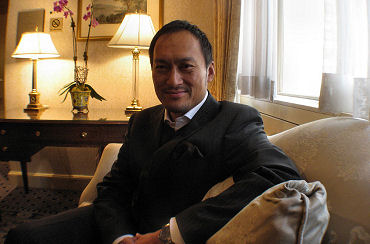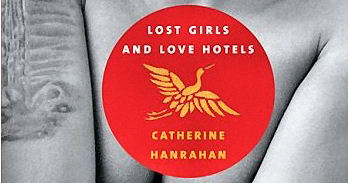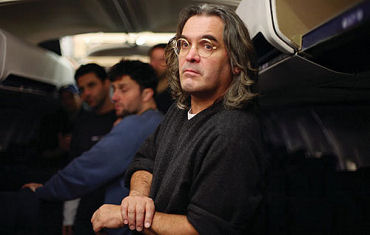I’ve been meaning to link to Anne Thompson‘s 12.8 “Risky Business” column about Blood Diamond but the title — “Diamond is rough, for a bigger purpose” — made me delay reading it because it suggested a softball approach. Then I realized after reading it that it’s largely (if not entirely) about Anne buffing her relationship with Blood producer Paula Weinstein. That’s fine. I buff also; everyone does. But all the buffing in the world can’t change the fact that Blood Diamond is over. Too many withering reviews and a truly weak opening-weekend tally. The Best Actor headwind for Leonardo DiCaprio is the only thing fanning the flames at this point.
Manhattan pics #6

Grand Street near West Broadway; Outside Balthazar on Spring and Crosby; interior; Broadway just south of Spring; buffet provided to journos at today’s Letters From Iwo Jima junket.
Oscar chatter
Schlubby-looking guy: “Face it — Martin Scorsese‘s going to get robbed again.”
Balding, open-shirt-tailed older guy: “Are you nuts? Consider this: Robert Altman died with one less Best Director Oscar than Kevin Costner. The Academy won’t let that happen to Marty.”
— a snippet from “Chatter: The Oscar Race” in this week’s issue of New York magazine (“A Year in Culture”).
“Moan” at Numb-A-Thon
“With so many titles showing long before their theatrical release, studio representatives were insistent that print journalists (anyone outside the online fanboy community, that is) keep their reviews to themselves. Suffice to say that Craig Brewer‘s Black Snake Moan, in which an aging black man (Samuel L. Jackson) chains a white girl (Christina Ricci) to a radiator to cure her of promiscuity, is as outrageous as advance word indicates. Those who viewed √ɬ¢√¢‚Äö¬¨√Ö‚ÄúHustle and Flow as little more than an exploitation flick cloaked in Sundance pedigree will have more new evidence than they know what to do with come February.” — Austin 360’s John DeFore, from a report on on Harry Knowles‘ Butt-Numb-A-Thon.
Ken Watanabe
I sat down early this afternoon for a small round-table discussion with Letters From Iwo Jima star Ken Watanabe. Watanabe isn’t so much a smoothie as smoothly mannered, and very much the gentleman. He listens quietly and carefully to questions, and maintains good eye contact when replying. He occasionally uses dramatic pauses and deft body language to emphasize emotions. He was assisted by two translators, but his English sounded pretty good to me.

Letters From Iwo Jima star Ken Watanabe — Monday, 12.11.06, 12:55 pm — 18th floor of Manhattan’s Waldorf Astoria Hotel.
He plays a compassionate gentleman-hero type in Letters — Lt. General Tada- michi Kuribayashi, a bright, independent-minded hardcase with an old soul and an easy rapport with the lower-level foot soldiers. As the leader of the defending Japanese troops on Iwo Jima, he stands up for the little guy, occasionally pisses off his fellow bigwig officers, orders an unconventional island-defense involving the building of miles of underground caves and tunnels instead of the usual beachhead strategy, and generally goes his own way.
In short, Kuribayashi is a dignified rebel and, by anyone’s standards, a humanist hero. It’s a far more stirring and satisfying role for Watanabe than the ones he played in Memoirs of a Geisha or (poor fellow) The Last Samurai.
Here’s a recording of most of the discussion. The L line was against me this morning and so was the IRT Lex, so I came in a bit late and missed the first five minutes or so.
Put Nicole Ritchie in jail
If I were the presiding judge in the Nicole Ritchie driving-the- wrong-way-on-the-134 case, that dumb cooze would get 90 days in jail followed by a 60-day forced rehab under lock and key. No discussion …that’s it. If I’d been in L.A. I could have been been on the 134 and had a head-on collision; ditto one of my sons. I don’t care if I sound like a right-winger — she’s dangerous trash, a menace, a public enemy.
Bilge Ebiri on NYFCC voting
I would normally rewrite this just to rewrite it, but it’s pretty good on its own. Bilge Ebiri has quickly thrown together a piece about this morning’s New York Film Critics Circle voting — complete with catty Rex Reed comments, an Andrew Sarris bathroom break that almost threw the whole thing into chaos, and what happens when the Almodovar mob faces off against the 3-hour-Roumanian-art-film lovers.”


(l.) Rex Reed, (r.) Leah Rosen
Here’s a great description of what happened after the vote for Best Picture, which resulted in the prize going to Paul Greengrass’s United 93:
“First the room voted on whether or not to simply announce a tie in the category; almost nobody wanted to. Of the 22 critics who were physically present (proxy votes having dropped out after ballot #2), 12 went for United 93, giving it the squeakiest victory since Daniel Day-Lewis beat out Jack Nicholson in ’02. Lisa Schwarzbaum suggested that since even this 12-10 vote was a virtual tie, we really ought to award Best Picture to both films. Nobody really agreed (but no vote was taken).
A brief silence. Then, the voice of Rex Reed.
“So that’s it.”
Pause.
“The best film of 2006.”
Pause.
“According to the New York Film Critics Circle.”
Pause.
“Is United 93.”
Long, uncomfortable pause, plus some tittering.
“A film that no one in America wanted to see.”
At which point People critic Leah Rozen said, “And how did you vote, Rex?”
Bosworth & “Lost Girls”
She tried and failed to be Lois Lane and needs to do something else fast…something fairly strong…if not piercing then at least provocative..to restore her industry cred. And so Kate Bosworth has bought the movie rights to Catherine Hanahan‘s Lost Girls and Love Hotels (Pengnuin) — a nocturnal Lost in Translation without a Bill Murray figure and/or an absentee husband, plus a lot sexier and more dangerous and not that many laughs (if any)…ache-y-breaky Tokyo nihilism and (I’m told) a fair amount of bleak-steamy hotel-room sex.

On her My Space page, Hanrahan has written that she’s “really pleased to finally be able to let people know that Kate Bosworth has bought the film rights to Lost Girls and Love Hotels. She’s a talented actress and she obviously has good taste in books.”
Whitaker-Mirren
Whitaker-Mirren, Whitaker-Mirren, Whitaker- Mirren, Whitaker-Mirren, Whitaker-Mirren, Whitaker-Mirren…okay, all right, I get it.
United 93 triumphs
I’m just wondering if all those brave adults who refused to see United 93 when it opened last April — the “too soon!” crowd — might be inclined to give it a whirl on DVD now that it’s won the Best Picture prize from the New York Film Critics Circle. You know what? Naaaah.

Director Paul Greengrass during the shooting of United 93
Does this award put United 93 into the running for one of the five slots in the Best Picture Oscar noms? As much as I’d like to see this happen, my sense is that it probably won’t. Those Academy members who were too squeamish about seeing United 93 last April are probably in the same place now no matter how well it does with the critics groups. Universal’s Oscar strategist Tony Angelotti has his work cut out for him, but if anyone can do it…
Rest assured, there is at least some confusion and probably very little joy in Mudville (i.e., Movie City News) over this decision. David Poland pretty much dismissed this film right out of the gate.
I was delighted when I heard the news early this afternoon. I’d just finished a round-table chat with Letters From Iwo Jima star Ken Watanabe and was standing in the banquet room loading up on baked salmon with all the other junket freeloaders when I heard the news from publicist Jeff Hill. I’d pretty much given up any hope for distinguished black sheep of a movie and then…kapow!
Six months ago I wrote that “my choice for the best film of the year so far, no question, is Paul Greengrass‘s United 93 — a film that many, many people still don’t want to see, but is truly a pulse-pounder for the ages, in part because it’s so stunningly well-made, but mainly because the extraordinary craft manifests in all kinds of haunting ways.
“Composed of a thousand details and a thousand echoes, United 93 is a film about revisiting, recapturing, reanimating…about death, loss and a portrait of heroism that, for me, was too much to absorb in a single viewing. I’ve seen it five times, and I can’t wait to watch and re-watch the DVD.:
For the record, the top New York Film Critics Circle winners are United 93 for Best Film, The Departed‘s Martin Scorsese for Best Director, the Best Actress award to The Queen‘s Helen Mirren and the Best Actor prize to Forest Whitaker for The Last King of Scotland. Have there ever been a Best Actress and Best Actor pair that have won as many critics awards in tandem as Mirren and Whiaker have?
The awards presentation will take place on Sunday, 1.7.07 at the Supper Club, “a new venue for the organization this year.”
NYFCC awards as they happen
Voting for the 2006 New York Film Critics Circle winners is taking place right now. Keep tabs on the NYFCC website for updates, which will be posted one by one as they’re decided upon. So far, as of 11:14 am, the Best Supporting Actor award has gone to Jackie Earl Haley for Little Children and the Best Supporting Actress award has been nabbed by Jennifer Hudson for Dreamgirls. Previously: Best Screenplay award has gone to Peter Morgan for The Queen, the Best Cinematographer award has been given to Guillermo Navarro for his work on Pan’s Labyrinth, and the Best Animated Feature award has gone to Happy Feet.
There’s a lone wolf with a Blackerry who’s also posting the awards as they’re decided upon here.
Notes review by Chang
In Richard Eyre and Patrick Marber‘s Notes on a Scandal (Fox Searchlight, 12.27), “the riveting interplay between Judi Dench and Cate Blanchett draws blood with every scene, thanks to a precision-honed script and Eyre’s equally incisive direction,” writes Variety’s Justin Chang.
“Zoe Heller‘s compelling 2003 novel unraveled the sordid tale of a schoolteacher’s affair with one of her young pupils, taking the form of a coolly perceptive and bitingly funny diary written by a close friend. The book’s subversive achievement was to project the diarist’s own gaze back upon herself, turning a salacious tabloid tale into a subtle and revelatory act of confession.
“What Heller achieved through tricky literary technique, Eyre and scribe Marber (Closer) have inevitably rendered more explicitly, playing up the obsessive lesbian-stalker angle with a discreet nod in the direction of Fatal Attraction. What makes Notes on a Scandal more than just a Lifetime-ready psychothriller — as well as a satisfyingly nasty awards-season tonic — is the ruthless economy of its execution from start to finish.”

